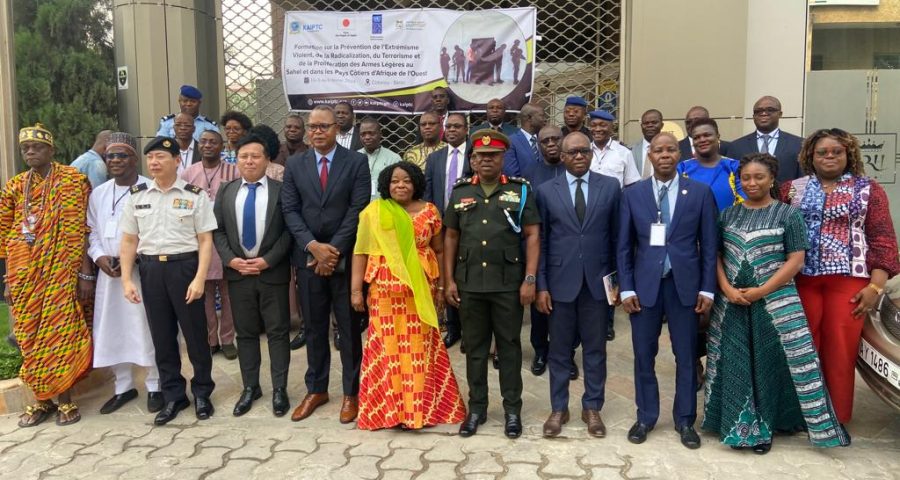(9th February, 2023) Accra, Ghana: The Kofi Annan International Peacekeeping Training Centre (KAIPTC), with support from the Japanese Government, and in collaboration with the UNDP, has organized a capacity building course in Cotonou, Benin. The initiative seeks to address the growing challenges of violent extremism, radicalization, and small arms diversions in the Sahel and adjacent coastal countries of West Africa.
The capacity building course targets critical issues such as expanding terrorist, radicalization and violent extremist networks facilitated by the illicit trade and diversions of small arms and improvised explosive devices -IEDs- in seven West African nations – Benin, Togo, Ghana, Cote d’Ivoire, Niger, Mali, and Burkina Faso. The primary objective is to enhance knowledge, information-sharing, and collaboration among various stakeholders to effectively prevent and counter these twin threats.
Welcoming all participants to the course, Controller General of Police Louis Tokpanou, Director-General of the Permanent Secretariat for the National Commission for the Fight against Radicalization and Terrorism in Benin, acknowledged the gravity of the security situation and welcomed collaborative efforts to address the menace.
In his opening remarks Major General Richard Addo-Gyane, Commandant of the KAIPTC, stressed the urgency of addressing the alarming surge in terrorist activities within the Sahel region. He highlighted the critical link between small arms proliferation and the spread of violent extremism, emphasizing the importance of interventions like the ongoing initiative.
Mr. Ichijo Motonobu, Charge d’Affaires of the Embassy of Japan in Benin, expressed Japan’s commitment to supporting initiatives contributing to peace and security in Africa. He highlighted Japan’s financial support to KAIPTC over the years and announced further contributions to peace and stability in the Sahel region and neighboring coastal countries.
Ghana’s Ambassador to Benin, Ms. Christine Churcher, highligted the devastating consequences of terrorism and violent extremism in the West African region. She emphasized the need for strengthened security cooperation and the importance of initiatives like the Accra Initiative in curbing these threats.
Delivering the key note address and opening the 5 Day capacity building course, the Minister of Interior and Public Security of the Republic of Benin Mr. Alassane SEIDOU, who was represented by Mr Olussoumare Abasse, thanked the KAIPTC for the timely initiative and expressed the gratitude of the Benin government. He reiterated that the presence of the diverse actors from both the state and civil society signified the need for a common understanding of the challenges facing not only the state, but also adjoining countries in addressing the increasing security threats. He further added, that the capacity building intervention aligned with the vision of the Government of Benin through the Government Action Program (PAG 2021-2026), to opt for a strengthening of internal security and the defense of the national territory through adequate security provision for the people. He urged all participants to be rigorous and assiduous in partaking in all the teachings to enable them derive the maximum benefits to counter the security threats.
A total of 28 participants, including representatives from state security institutions and civil society organizations, are actively participating in the programme. These include participants from the police, national small arms commission, forest and park agencies, counter terrorism unit, religious and traditional leaders, military and NGO’s. participants expressed their commitment to preventing violent extremism, radicalization, and the proliferation of small arms. For some of them it was the first time they were hearing about some of the issues particularly for civil society participants who were happy with the overview of the small arms proliferation and diversion issues in West Africa. Also received with great interest was locating their role in preventing the recourse to violent extremism and terrorism. The ceremony concluded on the 9th of February with the donation of two motorbikes to the counter terrorism unit and intelligence agency of the Benin national police. The motorbikes are to aid ongoing efforts in fighting the security threats in the country. All dignitaries and participants were unanimous in their acclamation of the utility of the capacity building course, with participants optimistic about a more secure and stable West Africa.






